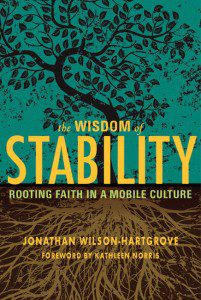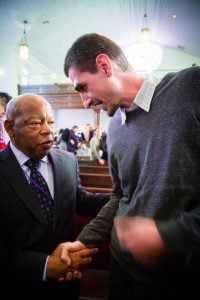Every once in a while, I stumble across a conversation that sounds familiar. Not only are people speaking my language, but they’re talking about the things that seem to matter most. Call it a moment of recognition. Call it a soul connection. Whatever you call it, it’s a gift. And gifts are to be celebrated.
I’m especially grateful for conversations that are happening today about faithfulness in place. I talked to the dean of a liberal arts school last week who said his students are so into Wendell Berry he’s afraid they’re all going to just go back home when they graduate and buy a farm. While their agrarian impulses may be a bit romantic, they’re rooted in a recognition that speed and placelessness have fragmented contemporary life in a way that social networks and jet plane cannot piece back together. It’s not just undergrads who are realizing this. There’s a veritable movement, especially among so-called “emerging adults,” of people who simply want to find their place in the world.
A couple of years ago, I wrote The Wisdom of Stability to uncover some of the church’s ancient wisdom for just such a movement as this. I wrote it because I needed it. But as I’ve talked to young people on college campuses over the past year (from Duke University to Denver Seminary, Calvin College to Furman University), it turns out other people need this wisdom too. Monastic wisdom interjects into the exciting conversation about staying put and paying attention the great hope that Christian tradition might have not only resources to sustain us, but also a gift to offer the world.
But as I’ve talked to young people on college campuses over the past year (from Duke University to Denver Seminary, Calvin College to Furman University), it turns out other people need this wisdom too. Monastic wisdom interjects into the exciting conversation about staying put and paying attention the great hope that Christian tradition might have not only resources to sustain us, but also a gift to offer the world.
I’m delighted that the folks over at Christianity Today are hosting a space for this conversation about place at their new blog This Is Our City, featuring reflections on the particular challenge of living out our faith in Portland, Richmond, Detroit, New York, Phoenix, and a Seventh City–that is, the place where you are.
I was glad to join the conversation this week with an intro to some of stability’s wisdom:
Early in the 6th century, Benedict of Nursia wrote a rule of life for monks who were longing for community and connection with God. Some 1,500 years later, the Rule of Benedict is one of the most lasting and widespread guides for religious life in the West. Benedict knew that the spiritual seekers of his day had big dreams and great hopes, not unlike the inner stirrings that had inspired his spiritual journey as a young man. Benedict did not squash human ambition, but he saw clearly that if we want to ascend to life with God, it matters a great deal which ladder we climb ….
Like the African American spiritual written a millennium later, Benedict insisted, “We are climbing Jacob’s ladder.” The angels going up and down from heaven to earth presented a practical lesson for Benedict’s community: “Without doubt, this descent and ascent can signify only that we descend by exaltation and ascend by humility.” The way that leads to life, Benedict told his followers, is a way of humility. According to the Rule, people who follow this way of humility promise “stability, fidelity to monastic life, and obedience.” The threefold commitment is made as one promise, Benedictines say, something like the Father, Son, and Holy Spirit are said to be one essence. But it’s striking to me that Benedict decided to put stability first in his list. If we’re going to climb Jacob’s ladder toward the humility of Jesus, Benedictine wisdom says the first thing we need is a stable place to begin.
You can read the full reflection and join the conversation yourself at http://www.christianitytoday.com/thisisourcity/7thcity/placelessculture.html?paging=off.











